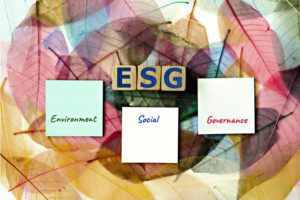Rebalanced ESG ETFs Index Down 6.9% YTD

It is important to fully understand the growing importance of ESG (environmental, social, and governance) investing and the best performing ESG ETFs to consider investing in and this article does just that.
ESG investing means that investments are made only in the businesses and their financial securities which are compliant with environmental, social, and governance norms for doing their business and conducting operations. ESG scores are composed of three types of criteria: environmental, social, and governance.
(Click on image to enlarge)

Below are 7 reasons for the growing importance of ESG investing, namely:
- Countries are beginning to embrace sustainable strategies and the overall demand for sustainable funds is expected to continue on this upward trend.
- Governments of 60 countries are working towards a net-zero emissions future, in which greenhouse gas emissions are reduced or offset.
- Industries reliant on energy needs from fossil fuels are beginning to shift to renewable energy in an attempt to achieve the goal of net-zero emissions by 2050.
- Companies are becoming much more conscious of ESG criteria far beyond the environment.
- Consumers want to know to what extent companies are taking ESG considerations into account in their operations and the extent to which they are doing so to ensure their purchases will be sustainable.
- Investors are seeing a unique opportunity to tap into the ESG market given the billions of dollars flowing into the energy transition.
- The investment landscape is changing with the demand for sustainable fixed income strategies also growing rapidly in addition to equities.
ESG investing requires positive answers to the following questions regarding:
- Environment:
- What is the company’s attitude toward climate change?
- To what extent is the company attempting to minimize its carbon footprint?
- How does the company manage its environmental impact?
- How does the company handle air or water pollution arising from its operations?
- How much progress has the company made in utilizing renewable energy sources?
- How sustainable are the company’s efforts in its supply chain?
- Social:
- How does the company improve its social impact?
- Does the company offer fair levels of compensation for employees?
- What are the companies’ policies regarding LGBTQ+ equality, racial diversity and inclusive hiring practices?
- How does the company advocate for social good in the wider world, beyond its limited sphere of business?
- Governance:
- How do management and the board of directors address the interests of the company’s employees, shareholders, and customers?
- Is executive compensation balanced compared to pay for other employees?
- How does the company’s board and management drive positive change?
- Does the board foster diversity in leadership?
- Are its interactions with shareholders positive?
ESG investing is not just about aligning your financial goals with your values. Studies show that ESG investing can reduce volatility and improve returns. In fact, ESG funds did better than the broader market during the stock volatility surrounding the coronavirus pandemic.
Creating A Short List For the munKNEE ESG ETF Index
- There are 126 exchange-traded funds (ETFs) in FKnol.com's ESG category database which belong to the ESG category.
- Of those, 50 have been ranked as per their ESG Risk Ratings (a snapshot of how well ESG risk is managed at a fund level relative to its peer group) by Morningstar.
- Of those, 29 have Morningstar "leader" (AA, AAA) scores of 7.2 or more.
- Only 10, however, are consistent out-performers and, as such, make up a rebalanced (see previous list of constituents here) list of constituents in the munKNEE ESG ETF Index.
Below is how the constituents have performed YTD (as of May 31st) and from their 52-week highs with their ESG scores:
- Vanguard Value ETF (VTV): -1.5% YTD; -5.1% from its 52-week high; ESG Score: 7.2
- iShares Core U.S. Value ETF (IUSV): -3.5%YTD; -6.2% from its 52-week high; ESG Score: 7.7
- Vanguard S&P 500 Value ETF (VOOV): -3.5% YTD; -6.1% from its 52-week high; ESG Score: 7.4
- SPDR S&P 500 Value ETF (SPYV): -3.5% YTD; -6.1% from its 52-week high; ESG Score: 7.5
- JPMorgan Diversified Return ETF (JPUS): -4.2% YTD; -6.0% from its 52-week high; ESG Score: 7.9
- Vanguard Russell 1000 Value ETF (VONV); -4.5% YTD; -6.8% from its 52-week high; ESG Score: 7.4
- JPMorgan U.S. Value Factor ETF (JVAL): -7.2% YTD; -9.5% from its 52-week high; ESG Score: 8.4
- Vanguard Health Care ETF (VHT): -9.0% YTD; -10.0% from its 520week high; ESG Score: 7.5
- Invesco Russell Top 200 ETF (EQWL): -9.1% YTD; -11.2% from its 52-week high; ESG Score: 7.5
- S&P Health Care ETF (RYH): -11.1% YTD; -11.9% from its 52-week high; ESG Score: 7.2
The above 10 ESG ETFs are DOWN 6.9% YTD, on average, and DOWN 8.3% from their 52-week highs with an average ESG score of 7.45.
Visit munKNEE.com and register to receive our free Market Intelligence Report newsletter (sample more



